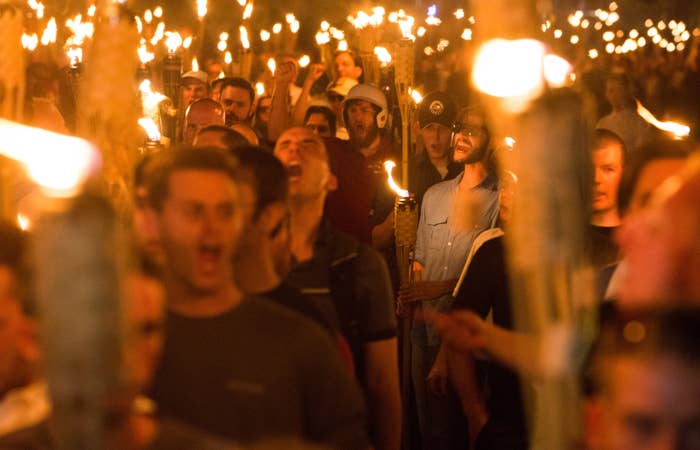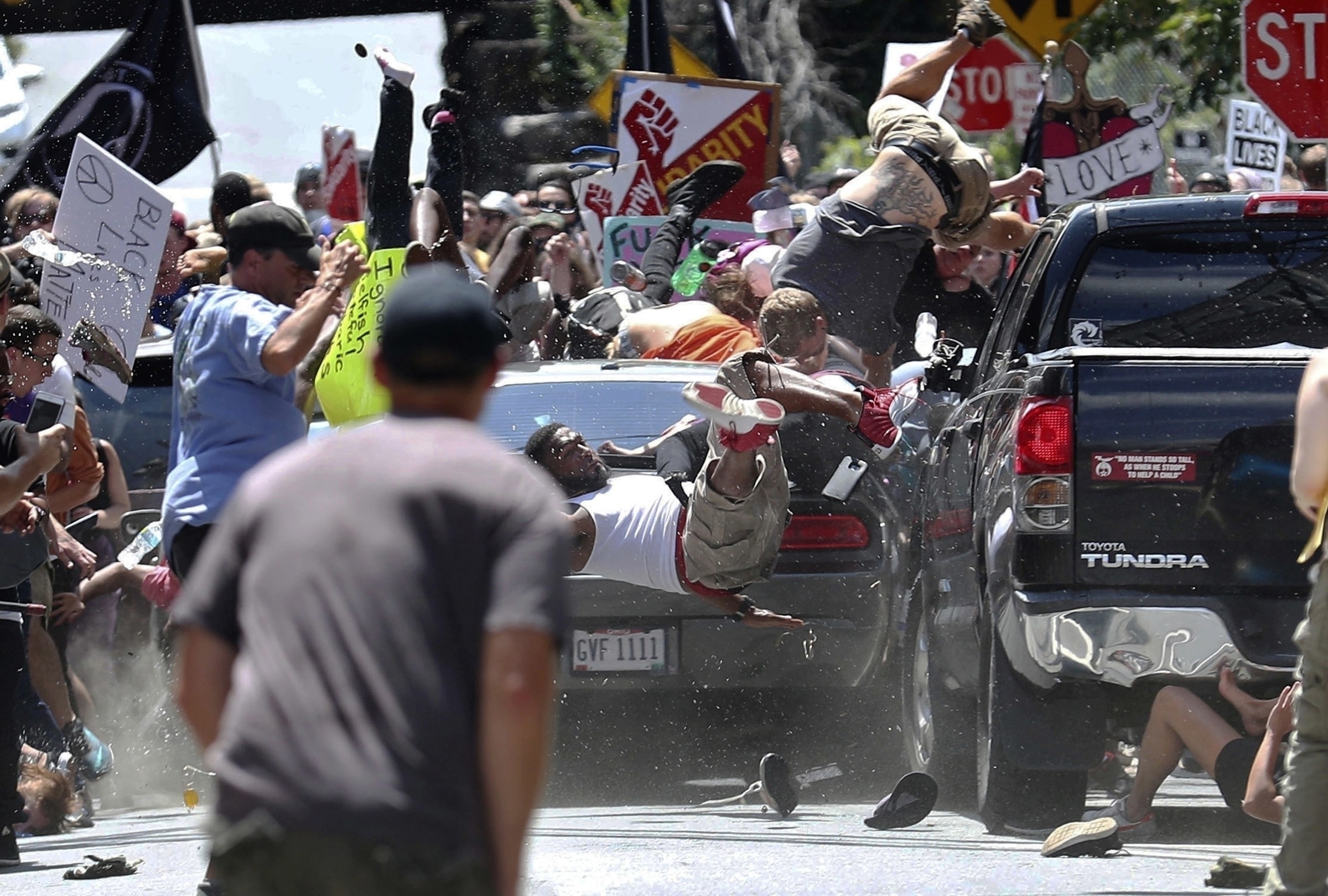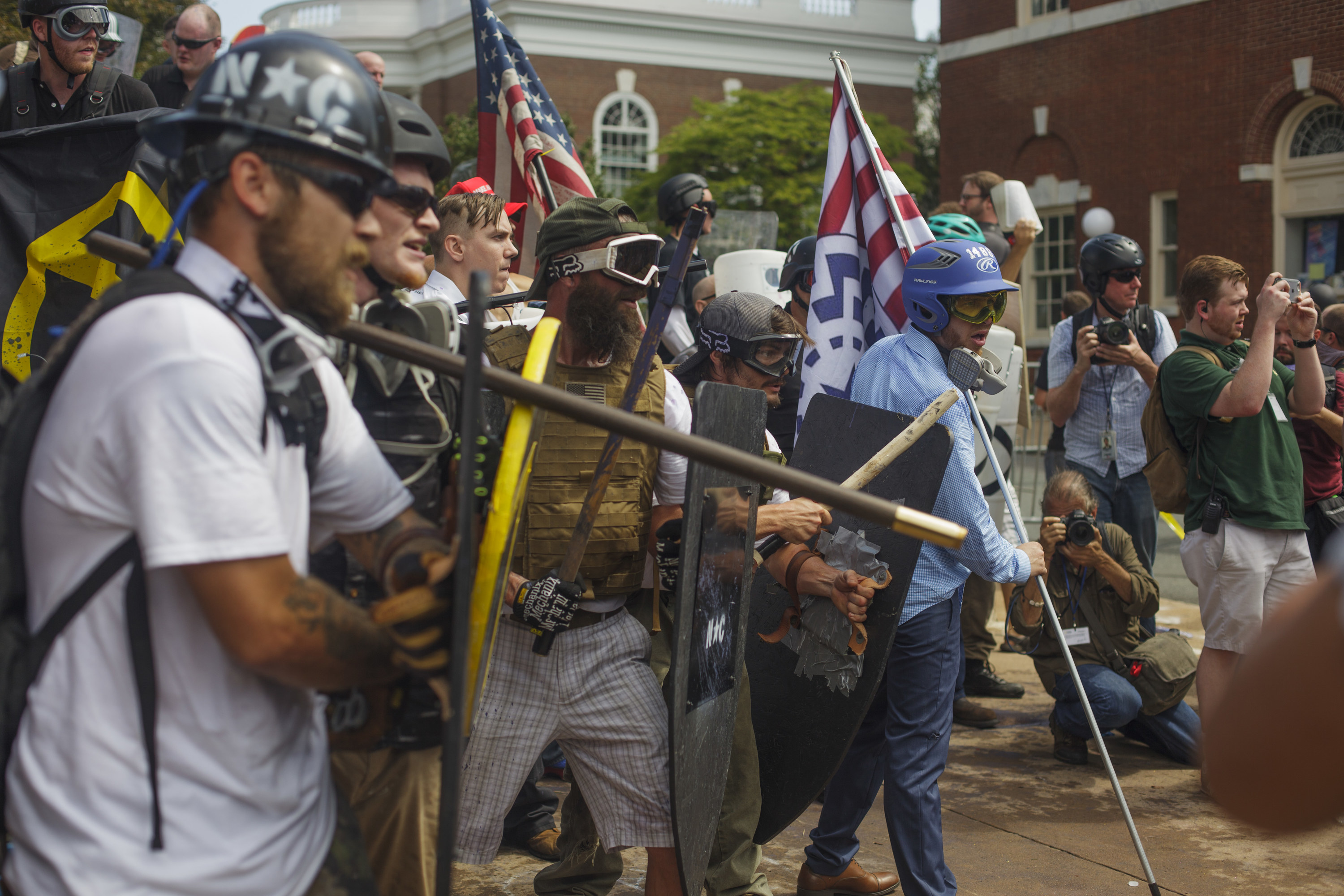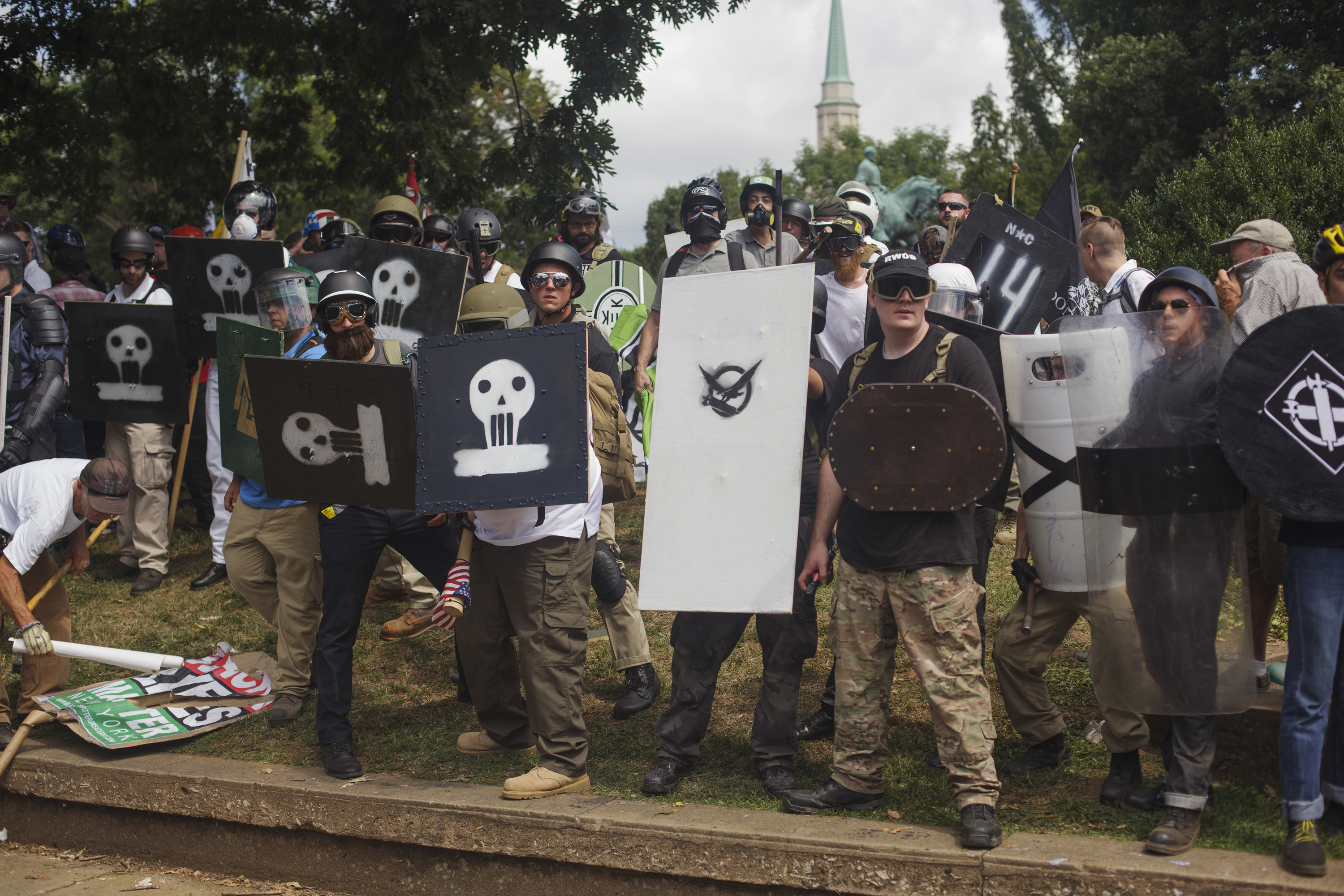
The shockingly violent, hate-filled events of the August 2017 “Unite the Right” rally in Charlottesville scarred the American conscience: The snarling faces of hundreds of neo-Nazis and other white supremacists chanting “Jews will not replace us.” The tiki torches they carried and swastikas they flaunted as they marched through the city. The white mob standing over and beating a young Black man scrambling for his life. The gray Dodge Challenger ramming into a crowd of anti-racist activists, launching people into the air and killing 32-year-old Heather Heyer.
And then there were the words of then-president Donald Trump, that among the white supremacist attackers there were “very fine people.”
The violence in Charlottesville not only reopened old wounds but forged an extremist path that would lead to more deadly white supremacist attacks and the Jan. 6 insurrection at the Capitol. The US has never fully reckoned with this painful chapter of recent history, but on Monday, a long-awaited civil trial gets underway in federal court. Victims of that violence and their legal team, as well as many other Americans, are hoping they will finally see justice served against some of the most notorious white supremacists in the country.
“This really will be the first time the entire story of Charlottesville will be told out loud,” Karen Dunn, co–lead counsel for the victims, told BuzzFeed News.
Amy Spitalnick, executive director of Integrity First for America, the civil rights nonprofit group backing the lawsuit, believes the trial will be a consequential moment for Charlottesville and the nation. She told BuzzFeed News that it will be a chance not only to hold violent white supremacists accountable but also to “prevent them from striking again ... by effectively bankrupting and dismantling these groups and their leaders.”
The trial will run until Nov. 19, and BuzzFeed News will be there, providing regular coverage from Charlottesville. Here’s what you need to know before it begins.
We want your help! If you have information or a tip related to the trial in Charlottesville or domestic violent extremism generally, contact christopher.miller@buzzfeed.com, or reach us securely at tips.buzzfeed.com.
The Lawsuit
The lawsuit was filed on Oct. 11, 2017, in the US District Court for the Western District of Virginia under the Ku Klux Klan Act of 1871, which was key in taking down the white supremacist group as it swept across the South after the Civil War. The statute allows the victims of racially motivated violence to sue when there’s a conspiracy to commit that violence.
It targets two dozen “Unite the Right” rally organizers, who IFA alleges did not plan a peaceful protest but, rather, meticulously conspired to bring violence to Charlottesville.
The organizers, according to the complaint, planned in advance “to intimidate, harass, incite, and cause violence to people based on their race, religion, ethnicity, and sexual orientation.”
IFA is hoping for a multimillion-dollar judgment in favor of the plaintiffs that would bankrupt and dismantle the network of the white supremacists and organizations they’re affiliated with. Ultimately, it will be the court that decides how much, if anything, is awarded to the victims.
The high-stakes trial will see several people injured in Charlottesville take the stand to speak about how they were impacted. Some of the “Unite the Right” organizers themselves are also expected to return to the city and appear in court.
To date, only a few of the white supremacists involved in Charlottesville have been held accountable for the violence that transpired that day. James Fields, the white supremacist from Ohio who rammed a crowd of protesters with his car, was convicted of first-degree murder in 2018 and sentenced to life in prison. Four men who were convicted in the beating of anti-racist protester DeAndre Harris were sentenced to between two and eight years in prison.
Heidi Beirich, a cofounder of the Global Project against Hate and Extremism who previously worked with the Southern Poverty Law Center to take violent white supremacist groups to court, told BuzzFeed News that the Charlottesville case is unique in its size and ambition.
“I worked at the SPLC for a long time, and we did a lot of civil cases that were similar to this, attempts to bankrupt hate groups that had committed violence and harmed people. But we were taking on one organization,” she said. “They are taking on a whole host of groups that were involved in the violence in Charlottesville... [The case] has a scope that is unlike anything else I’ve seen.”
The Plaintiffs
There are nine plaintiffs in the case, including one identified only as John Doe. Many were physically injured during the “Unite the Right” violence.
Marcus Martin and his wife, Marissa Blair (his fiancé at the time of the rally), are among them. They had gone with Blair’s coworker, Heyer, to join activists countering the white supremacists in Charlottesville on Aug. 12, 2017. When Fields’s gray Dodge Challenger plowed into the group of activists, Martin was able to push Blair out of the way, but he was hit. A Pulitzer Prize–winning photograph of the incident shows Martin, wearing a white shirt and red-and-white Air Jordan sneakers, suspended in midair after being struck. His injuries included a broken leg and ankle that required surgery, according to the IFA.

Elizabeth Sines protested against the “Unite the Right” extremists on Aug. 11 and 12. A law student at the University of Virginia at the time, she narrowly avoided being physically injured, but IFA said she has suffered severe emotional distress and shock over what happened. In a 2019 interview with NPR, she recalled seeing the white supremacists march across the UVA campus with torches and said that the sound of the Challenger was still in her head, as was the image of the car’s driver backing up to roll over more people.
“That’s when it clicked,” she told NPR. “It very much seemed like he was going to try and kill as many people as possible.”
The other plaintiffs all lived, studied, or worked in Charlottesville at the time. They joined others in protesting against the white supremacists and suffered physical injuries and psychological trauma from the experience.
IFA’s Spitalnick, who’s grown close with several of the victims, said she expects their testimonies in court to be powerful, convincing, and emotional as they relive the traumatic events of four years ago.
The Defendants
The 24 defendants were all directly involved in organizing, promoting, and participating in the “Unite the Right” rally, but some have publicly denied conspiring to commit racially motivated violence in Charlottesville. Most of the defendants and attorneys for them didn’t respond to requests for comment or couldn’t be reached by BuzzFeed News. William Edward ReBrook, the attorney representing the Nationalist Socialist Movement as well as the organization’s commander at the time, Jeff Schoep, “categorically” denied the accusations leveled by IFA and the plaintiffs in the case. ReBrook added he believed the defendants would not receive a fair trial.
“Thus far, after more than two years of pleadings, discovery, motions, and conferences, plaintiffs have yet to produce a single piece of evidence to support their claim of a conspiracy to commit violence in Charlottesville,” he said. “If not for the fact that the defendants are mostly white supremacists, the suit would have been dismissed years ago.”
Beirich described them as “real players in the white supremacy movement prior to Charlottesville” and part of “a whole panoply of hate groups that were there that day.”

Richard Spencer, head of the white nationalist National Policy Institute who was infamously caught on video telling a crowd of Nazi-saluting supporters “Hail Trump!” at a 2016 postelection event in Washington, DC, is perhaps the best known of the defendants. Even before the trial, he said the lawsuit had already been devastating and “very costly,” and he complained about being unable to raise money for his defense after being banned from various online platforms. In the past few years, he has kept a low profile and lived at his mother’s house in Whitefish, Montana.
“Now he’s basically persona non grata, he’s nothing, and nobody talks about him anymore,” Beirich said. “He was the white supremacist leader.”
Jason Kessler, a Charlottesville resident, white nationalist blogger, and onetime member of the far-right Proud Boys, is another defendant. He led the organizing efforts for the “Unite the Right” event and a second rally the following year in Washington, DC. In interviews and on social media, he has harassed and threatened people involved in the lawsuit and spoken ill of Heyer and other anti-racist activists who protested against him and other far-right extremists.
Then there’s Christopher Cantwell, the neo-Nazi podcaster who became a household name after being featured in a Vice News documentary about Charlottesville and was later dubbed the “crying Nazi” for weeping in a video about the violent event. He was sentenced to 41 months in prison after being convicted in 2020 for threatening rape and attempting to extort another neo-Nazi in an unrelated case.
Other defendants include the neo-Nazi leaders of various organizations that the SPLC and Anti-Defamation League identify as hate groups for their open displays of antisemitism and violent rhetoric toward minority groups.
Already, 7 of the 24 defendants have lost in default judgments, decisions made by the judge after they failed to cooperate with court orders. And the court has issued fines in the tens of thousands of dollars against three defendants for losing or destroying evidence and failing to appear for court hearings or depositions, according to court documents and Spitalnick.
The Trial
Jury selection begins Monday and is expected to last through Tuesday. Opening arguments will begin after that, as soon as Wednesday. Due to security concerns and COVID-19 restrictions, the courtroom will be occupied only by the judge, the jury, courtroom officials, the plaintiffs and defendants, and their attorneys. Journalists will watch from a separate room with a live video feed; audio of the trial will be available to the public.
Some of the defendants won’t be in attendance, either because they have refused to cooperate in the case or because they are in hiding. Of those who will appear, few have lawyers, and some are representing themselves due largely to their inability to raise money. (Unlike in criminal cases, lawyers are not constitutionally guaranteed to people who can’t afford them in civil cases.) A campaign to fundraise for their defense on the Christian crowdfunding site GiveSendGo has brought in just over $15,000. The defendants and their attorneys are likely to argue that the plaintiffs themselves were violent antifa and Black Lives Matter activists — although there is no evidence to suggest these things — and that their rally was protected by the First Amendment.

Spitalnick, Dunn, and Roberta Kaplan, the other co–lead counsel in the case, have spent four years methodically preparing for this trial and combed through 5.3 terabytes of digital evidence in the process. They said they’ll show how the “Unite the Right” violence — including ramming people with cars — was meticulously planned in advance. Their strategy in court is simple, Kaplan said: They’ll use the white supremacists’ own words against them.
Scraped from mobile devices and messaging app accounts, some of which were leaked and published online by activist media outlet Unicorn Riot, the defendants’ conversations provide insight into the days and weeks leading up to Charlottesville and the aftermath.
“There are times when I read their communication and am shocked by the openness in which they talk about and encourage these horrible acts of violence,” Kaplan said.
“One of the hardest parts of this case is picking out of the mountain of excellent evidence what is the best evidence, because there truly is a ton of it,” Dunn said. “We need to prove a conspiracy to commit racially motivated violence. And so the communications that are the most important to us are the ones that show conspiracy, agreement … intent to do violence or recognition of having done violence. And there’s plenty of that... It leaps off the page.”
And though Kaplan and Dunn plan to use that evidence to reveal the specific actions and intent of the 24 neo-Nazis and other white supremacists and get justice for the nine victims they represent, they believe the case will have much bigger implications.
“Every several years in our country’s history, there’s a trial that has an educational purpose for the American people,” said Kaplan, who led the case that defeated the Defense of Marriage Act and opened the door to marriage equality. “This is one of those cases.”
